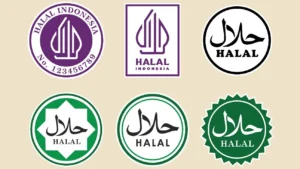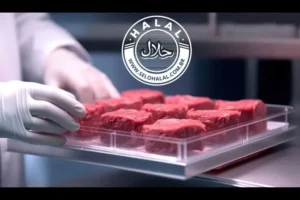Did you know that some halal foods can contain alcohol? Although it may seem contradictory at first glance, it is important to understand that not all alcohol is the same. In this article, we will detail the guidelines and restrictions for alcohol in halal foods and explain how to identify whether a halal product contains alcohol.
The Concept of Halal Food:
Halal foods are those that follow the guidelines of Islamic law, known as sharia. These guidelines stipulate which foods are permitted and which are prohibited for Muslims. For example, halal foods exclude pork, blood, and inappropriately sacrificed animals. Furthermore, the presence of alcohol is prohibited, as it is considered an intoxicating substance and harmful to the health and faith of Muslims. Islam takes a holistic approach to health, prohibiting any harmful or predominantly harmful substances.
((O you who have believed, indeed, intoxicants, gambling, [sacrificing on] stone alters [to other than Allah ], and divining arrows are but defilement from the work of Satan, so avoid it that you may be successful.)) (Quran 5: 90)
However, it is vital to understand that not all alcohol is prohibited. There are different types of alcohol, and some of them can be present in halal foods without violating Islamic norms. Let’s explore these types and their impact on halal foods.
What types of alcohol are there?
Ethanol (C 2 H 5 OH), also called ethyl alcohol and, in everyday language, simply alcohol, is a chemical substance that can be produced in different ways. One of them is fermentation, which is a natural process in which microorganisms transform sugars into alcohol and carbon dioxide.
Fermentation can occur in foods such as bread, yogurt, fruit and vinegar.
Another way to produce alcohol is distillation, which is an artificial process in which alcohol is separated from a liquid mixture. Distillation can produce alcoholic beverages such as wine, beer, whiskey and vodka.
Islamic jurists have classified alcohol into two categories: khamr alcohol and non-khamr alcohol. Khamr alcohol is alcohol that is derived from dates or grapes, and has the potential to make people drunk. Khamr alcohol is prohibited in any quantity and form, whether in drinks or food.
Ethyl alcohol (ethanol C 2 H 5 OH) non-khamr is alcohol that is derived from any source other than dates or grapes, and that does not have the potential to make people drunk. Non-khamr alcohol may be permitted in small amounts and forms as long as it does not cause intoxication or mental alteration.
Guidelines and Restrictions for Ethyl Alcohol in Halal Foods:
A food is considered free of ethyl alcohol (ethanol) if the amount resulting from natural fermentations is so small that it is equal to or less than the percentages specified for each type of food. One of the Brazilian certification entities, follows international halal standards, establishing two control points for alcohol in foods and ingredients:
- Less than 0.1% in final food products.
- Less than 0.5% in food ingredients.
These limits apply to non-khamr ethyl alcohol, which may be present in some foods due to natural fermentation or the addition of flavorings or preservatives. For example, bread can contain up to 0.1% alcohol due to yeast; mayonnaise can contain up to 0.5% alcohol due to the vinegar; and cooked beans may contain up to 0.5% ethyl alcohol due to tomato sauce.
However, if the alcohol in a product is known to be derived from dates or grapes, it would be prohibited for Muslim consumption regardless of quantity or form. For example, wine, derived from grapes and containing khamr alcohol, is prohibited in any quantity and form.
How to Identify Alcohol in Halal Foods:
To check whether a halal food contains alcohol, you need to examine the product label and halal certification. The label must detail the ingredients and composition of the food, including the presence and origin of alcohol. Halal certification ensures that the product meets Islamic standards, including alcohol limits.
Furthermore, it is essential to be aware of products with hidden alcohol, such as juices, soft drinks and energy drinks, which may contain alcohol derived from dates or grapes. Imported foods, such as chocolates, cookies and ice cream, may also contain alcohol derived from flavorings or preservatives. In such cases, it is recommended to consult the website of a trusted certifier.
For a company that wants to certify its products, it is recommended to carry out Gas Chromatography – GC is a method of detecting residual solvents, used to measure the percentage of ethanol in the analyzed products.
Conclusion
Halal foods are those that follow the rules of Islamic law and do not contain alcohol in significant quantities. Alcohol can be classified as khamr or non-khamr depending on the origin and effect. Khamr alcohol is prohibited in any quantity and form, while non-khamr alcohol may be permitted in small quantities and forms. To find out if a halal food contains alcohol, you need to check the label, certification and origin of the product.









